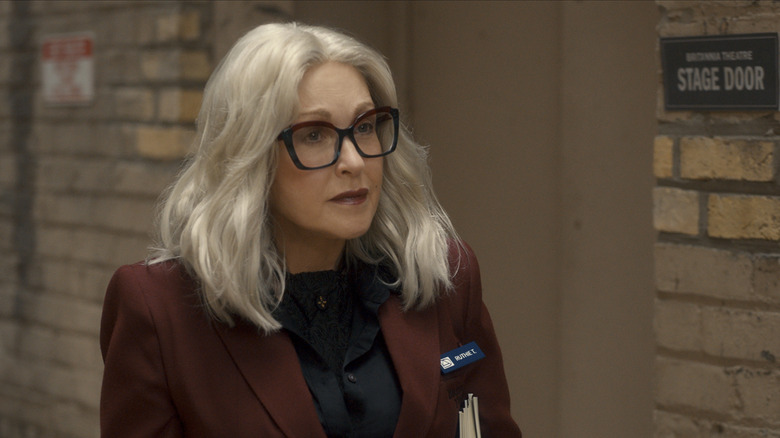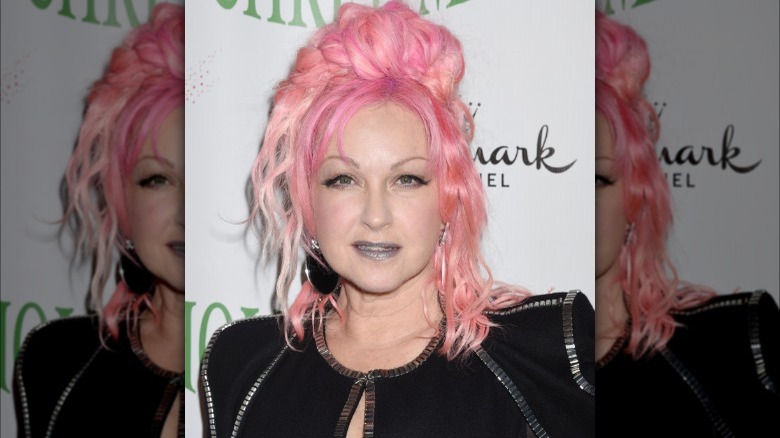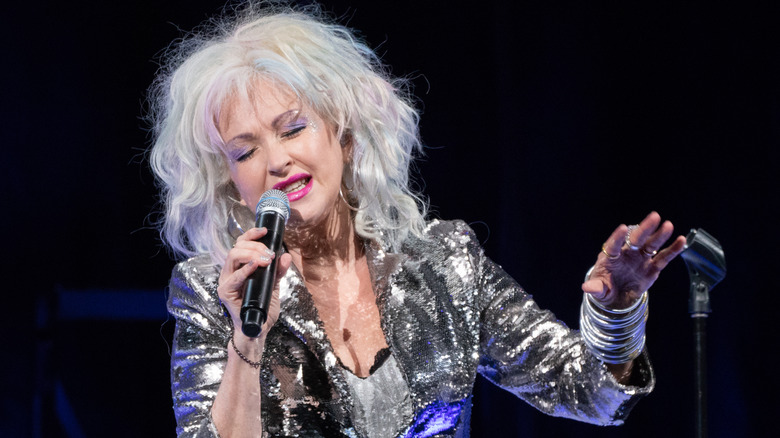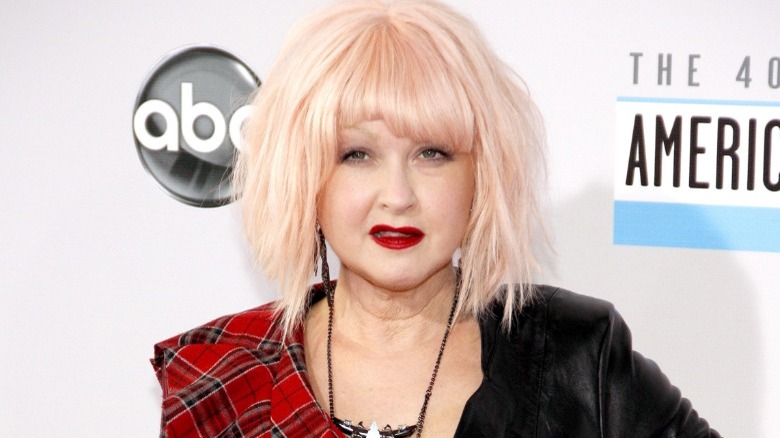Cyndi Lauper Puts Her Many Talents On Display For The Horror Of Dolores Roach - Exclusive Interview
We may receive a commission on purchases made from links.
As an award-winning musician and writer, Cyndi Lauper needs little introduction. In fact, some of her most famous songs — such as "Girls Just Want to Have Fun," "True Colors," and "Time After Time" — continue to be listened to and celebrated decades after their release.
Now, Lauper is making a return to acting in Prime Video's "The Horror of Dolores Roach", and it's clear that she had a lot of fun making the horror-comedy series. "I've got to say, this show is fun," she tells The List. "... It was fun to do because it was scary, it was funny, it was a little sad. [It] had a little of everything, and a good story. It was a solid story."
"The Horror of Dolores Roach" is a modern retelling of "Sweeney Todd," based upon the Spotify podcast of the same name. After 16 years in prison, Dolores (Justina Machado of "One Day at a Time") finds that her neighborhood has been completely gentrified. She finds solace in her old friend, Luis (Alejandro Hernandez), but life is far from tranquil. Instead, Dolores finds herself at the center of a murder investigation and embroiled in a shocking business venture involving cannibalism.
In an exclusive interview with The List, Cyndi Lauper opens up about working on "The Horror of Dolores Roach" and writing a song for the series, and she reveals why she's such a staunch advocate for human rights.
Returning to acting for Dolores Roach
What drew you to "The Horror of Dolores Roach"? I watched the entire series yesterday, and I loved it.
It's a binger, right? Once you start, it's like, "Oh, man." The storytelling is filled. It's terrific writing, and the story is a good story with a landscape of wonderful characters. They have these wonderful actors in it. They look like real people. There was one thing that got me — the characters look like real people, and I thought, "Wow, that's fun and very diverse." You know me — I was always big on that. Even with "Girls Just Want to Have Fun," I was like, "We're in New York. We want it to look like New York," so everybody could see themselves.
The population of their story [in "The Horror of Dolores Roach"] is diverse. The people behind the scenes were diverse. It was fantastic. And the writers — it was such a creative process. To stand behind the camera and watch, they used really modern technology to do it. You notice how pretty it is?
It doesn't look like anything else that's on the screen at the moment.
It's the [director of photography] and how they decided to work on it — the production, the producers, and of course Aaron Mark and Dara Resnik. Aaron, he's a fantastic writer. The writing team that they had was fantastic, because when you have dialogue that sounds like it was generated in your head, or the head of the character that you are becoming, then that's a lot of fun. That was really a lot of fun for me.
Creating my character [Ruthie] with the wardrobe guy ... we went shopping together, and I had a lot of fun with him. ... I wanted to have gray hair. I went shopping for a wig because I get wigs sometimes. When you go on tour and you want to come back with a hair on your head, sometimes you have wigs instead of messing your own hair up. When I walked into the shop and I saw this gray wig, I was like, "Got to have that. Got to have gray hair."
Finding inspiration in Kinky Boots for her character, Ruthie
When I was doing [the musical] "Kinky Boots," I spent a lot of time in the theater watching the shows. [When] you're in the corner over here [or] you're up in the balcony over there, you start to get to know the ushers. I based my wardrobe [for Ruthie] on ushers that I had seen. The ushers in the Hirschfeld Theater dressed all in black, [but] the ones up in Chicago had the maroon jacket and black. That's what I kept seeing in my head, the maroon jacket, and I wanted to look like how they look. I thought getting to know them was great, and then getting to play one was even better.
My character, Ruthie, she's the usher. Broadway and Shakespeare [are her passions]. Also, she's a PI. She never don't find them. How fun is that? It's funny and it's scary, and then sometimes it's sad, and then you're laughing again, or you're screaming. [It] goes through all of it, and it's pretty. I'm really excited about it. Justina Machado is a wonderful, wonderful actress. They all were. I thought they all were.
You spent a lot of time acting opposite Justina Machado. Was it fun collaborating with her?
Yes, I had a lot of fun, and the director was fantastic. The director was from Mexico. In Mexico City, there's a whole artist community of incredibly gifted filmmakers. The director that directed my part of it was a Japanese Mexican woman, and she is fantastic.
The [director of photography] was fantastic. I was watching him because every time I go in front of the camera, anytime I look good, I'm checking out what they did. I'm checking out the lights. I watched the guy edit. I was like, "Oh my god," because there's a whole new camera thing that they're doing, where they don't need to use a lot of wipes ... The cameras are totally different now, which is amazing. I love technology. I was fascinated by the way they were doing it, and I was really excited to be part of it. In the end, I said, "You have a song for here? No? I think you should let me write one." They're all like, "Oh, yay." So I [did] it.
On writing a song for The Horror of Dolores Roach
It makes sense that they'd want to utilize your musical talents in "The Horror of Dolores Roach."
It's funny because when I recorded it, I went and did it old fashioned. We were on Pro Tools, but I also used tape in the end, in mastering, with this wonderful guy at Greenpoint, Fred Kevorkian. He's fantastic. The way he hears things and the equipment that he had — it's just his ears. It's not a big thing. It's not a big fancy place, but boy, his sounds. He just hears it. He's one of the classics, so I got him to master "Oh, Dolores."
I wrote it with Ben Hopkins from Pwr Bttm ... He was fantastic. He played all the guitars, including the bass. We wrote it together. I wrote it on one of the instruments that I have sitting by my piano. It's tuned like [a] dulcimer, but it's not [a] dulcimer, but it's tuned in fifths. That's my lane — open fifths, love them. I wrote using a slide on that instrument, and he tuned his guitar, and it was great writing with him. ... He did a great job [writing], and he did a great job playing those guitars.
Then we got my friend Shawn Pelton, who played drums. He's a wonderful drummer. [You] probably know his name because he plays with the "Saturday Night Live" band, for years. I have a singer that I work with in my band, Elaine Caswell – that's her husband. The way we mixed ... was COVID style after a while — go home, listen in your home studio, which is my office/closet. That's where you're doing a lot of your stuff. It was fun.
On advocating for abortion rights
I wanted to ask you about your activism because I love your support of the LGBTIQA+ community and that you've thrown yourself behind abortion rights. What does it mean to you to be an advocate?
Being a woman, these are our civil liberties. These are our rights. Think of it. Everybody's crazy about [saying], "I don't believe in this." Well, it's not your body, and if you don't believe in it, don't do it. People don't run to get an abortion because [they think], "Just get an abortion." No. It's a really hard and a very big decision. But it's a harsh decision, and it hurts you too, but sometimes, you've got to do the right thing for you because, guess what? It's your body. Or are we going into "The Handmaid's Tale"?
The truth is, if you don't have control over your own body, then who does? The lady down the block? The government? Should we call up the church lady and ask her when we can bleed and when we can't? Is that what we're going to be doing? Because that's a problem for me because I want civil liberties, complete autonomy over my body, just like any male. And a lot of those males were the same males that were saying, "I'm not going to have a vaccine. You can't tell me what to do with my body." But it's okay to tell a woman what to do with hers?
Of course I'm going to stand up and say something. ... Honestly, wake up. You can tell me, "I'm not a feminist. I'm a bad feminist." Let me tell you something, darling. If you went to college, thank the feminists. If you go to a bar at night, thank the feminists. If you belong to a health club, thank the feminists. If you're a lawyer, thank the feminists. If you get your own paycheck, thank the feminists. Because women did not [get to do those things before]. You have to know your history. You have to know where you came from to understand what's being done to you right now. ...
We're half the population. We don't have to take it anymore. You vote them out. What do you do? Get rid of them. It's called being fired, not hired. And what they spread — the whole thing with Trumpism and, "If you say a lie enough times, it becomes the truth." You know what? It is not the truth. I don't believe that we should not know the truth. I think you should know the truth. I don't think you should get your news from Facebook, unless it's a reputable news agency, unless you have real reporters who are held to a standard of fact-checking.
It's not like "Dolores Roach." That's a creative story, but in real life, there is fact-checking. There is a reality that we live as women. We don't get paid the same. We don't get the same opportunities. Maybe now things are opening up a little bit, but unless you stand up and say, "No, I don't take it" ... Anyway, don't get me started on all this because you know me.
This interview has been edited for clarity.
Watch "The Horror of Dolores Roach" on Prime Video beginning July 7.




